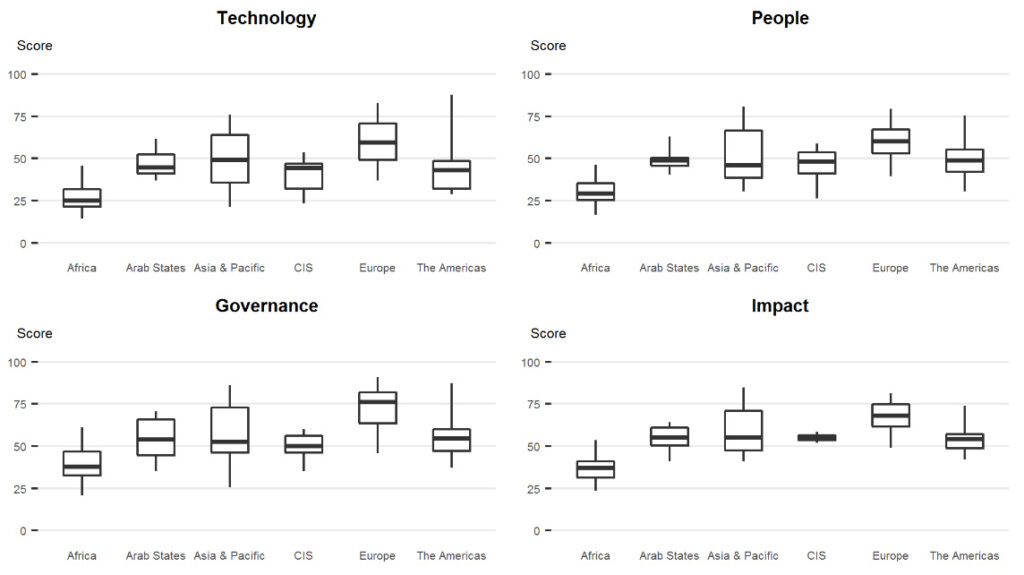Since the 2020 edition of the Network Readiness Index (NRI) was published in December 2020, African heads of state, ministers, and policymakers have continued to express increasing levels of interest in national digital transformation in response to the effects of the COVID-19 pandemic. In looking at such requests, we find that our concept of network readiness could be particularly instructive in helping African policymakers to benchmark their readiness for national digital transformation and prioritize key areas for investment in accelerated digital transformation in the year ahead.
As the Digital Impact Alliance (DIAL) recently pointed out, a wide range of frameworks and data sources exist to help countries evaluate and monitor their progress in key areas of digitalization, the reuse of which can help steer national transformation efforts. We hope that our recent launch of the 2021 edition of the NRI to add to this corpus of knowledge, as this is a unique moment in time to engage with the African continent, understand the challenges the region is facing in the wake of the COVID-19 pandemic, and ensure it does not fall behind.
Our 2021 report finds that the countries of Africa continue to be the most laggard regional group when it comes to network readiness when benchmarked across all pillars featured in the index (see Figure 1), though countries like Mauritius, South Africa, and Kenya continue to be regional leaders. This is a result of historical inequities as well as recent economic challenges countries have faced from the pandemic. The new report shows that across the pillars of Technology and People, the average within the African region places it close to the 25th-30th percentile (25.08 and 29.39 respectively), while in the pillars of Governance and Impact the region tracks a bit higher, closer to the 35th-40th percentile (37.67 and 37.01 respectively). (See Figure 1 for more detail on the regional comparison and breakdown.)

While comparison between years is challenging notably given (1) the actual performance of the economy in question; (2) adjustments made to the NRI framework; (3) data updates, the treatment of outliers, and missing values; and, (4) the inclusion or exclusion of economies in the sample some insights can be drawn in comparison to previous editions of the NRI. Across all areas, overall changes this year can likely be attributed to a range of factors, including (among others) historical trends and pandemic-era investments, though the specific rate of change and of causes of course differ between countries.
For a more detailed analysis, let’s take the example of five countries in particular from across the continent South Africa, Nigeria, Rwanda, Madagascar, Mali to trace the effects of the pandemic (see Figure 2) across the pillars. The relatively static nature of the Governance pillar in particular suggests that something needs to change in that area in particular1. If we look at the Technology Pillar, we see strong performance in countries at the top of the income distribution, with all other countries reporting progress as well. Interestingly, most countries reported strong relative performance in the People (human capabilities) and Impact pillars (effect on well-being).

At the same time as our findings demonstrate this case for optimism, though, they also underscore that the gains of accelerated digital transformation remain unequally distributed. As our sample suggests, between countries in the region there continues to be huge gaps between low-income and middle-income countries, a trend which holds true with high-income countries across the rest of the globe. There are also huge gaps within the countries, a fact which is highlighted by our country-by-country analyses. The digital divide within countries means that even as the numbers tick up for the region as a whole in some pillars, these numbers might yet obscure the realities that many women, marginalized groups, and those in rural areas continue to experience when compared to the privileged few, with huge costs for network readiness and the digital economy.
Notwithstanding varying scores across the five countries (which seem to track with their relative income levels), these five countries have, as a subset of the continent as a whole, demonstrated a strong commitment to national digital transformation this year, which might help explain changes in their performance. Rwanda and Nigeria continue to build on their established digital strategies, policies, and plans, while South Africa, Madagascar and Mali are investing in their own roadmaps for what digital transformation looks like in their countries. Moving forward, we want the NRI to be a tool for policymakers to in combination with other statistics diagnose their current status, benchmark their current performance against peers, and make incremental improvements.
In the wake of COVID-19, there is no region where digital transformation is more relevant than Africa. In the coming years, we hope for the NRI to be one of many tools for helping African policymakers to begin addressing these issues, as well as mobilize investment from global and regional partners in the types of foundational infrastructure, service teams, and capacity-building initiatives that will drive the network readiness of the future.
— Nicholas Gates
Nicholas (“Nick”) Gates is the Senior Associate, Policy and Research at the Digital Impact Alliance (DIAL). In his role, Nick focuses on policy and research supporting national digital transformation, with a focus on national transformation processes, digital government, and social inclusion. More broadly, Nick is experienced in mixed-methods research and project management for digital and grassroots development, with specialized experience in policy and advocacy. Before joining DIAL in 2019, Nick worked as a researcher at the University of Copenhagen and worked and volunteered in several NGOs in the United States, Denmark, and India. Nick graduated with an MSc in Global Development from the University of Copenhagen in Denmark in 2018, and holds an undergraduate dual degree from the University of Massachusetts Lowell in Political Science and History.
1. See: Rockefeller Foundation and Norad, Co-Develop: Digital Public Infrastructure for an Equitable Recovery, 29.